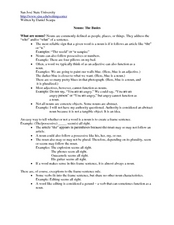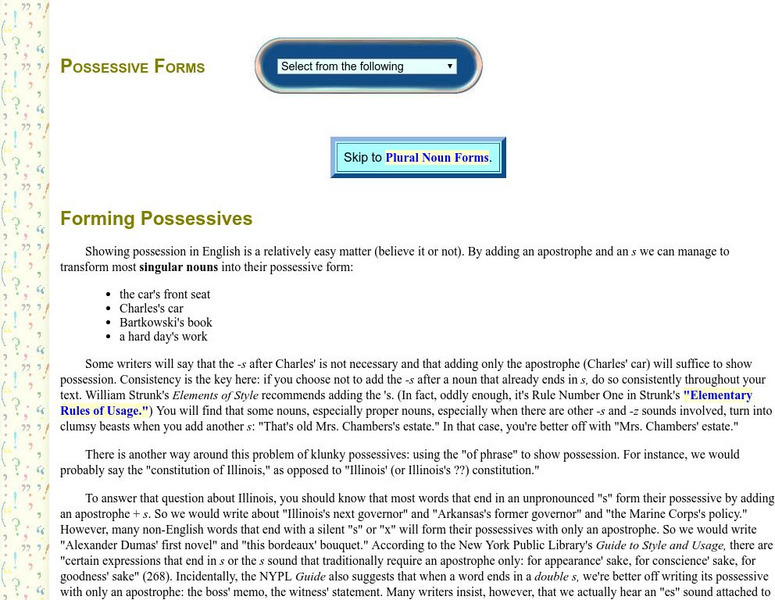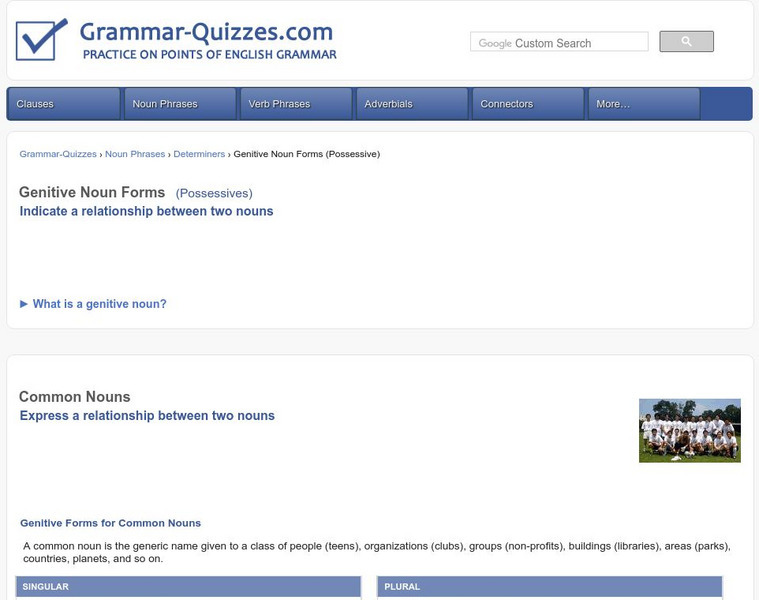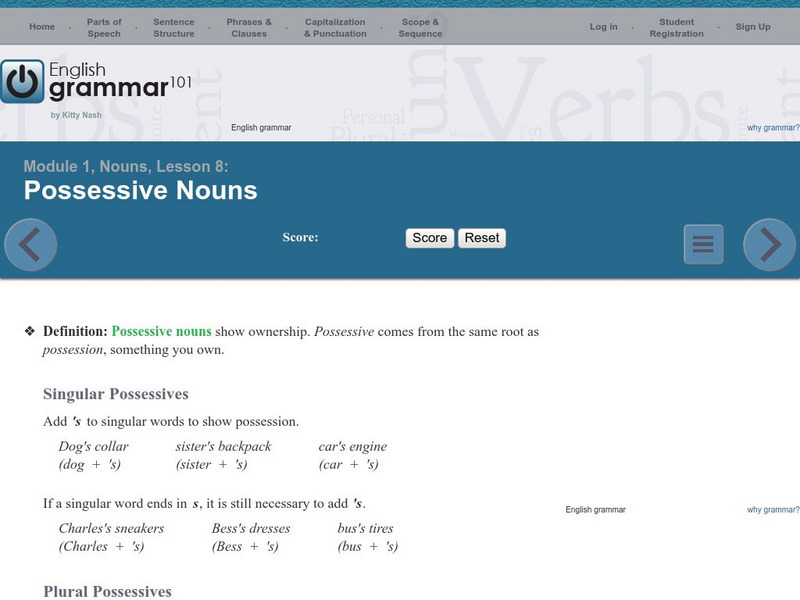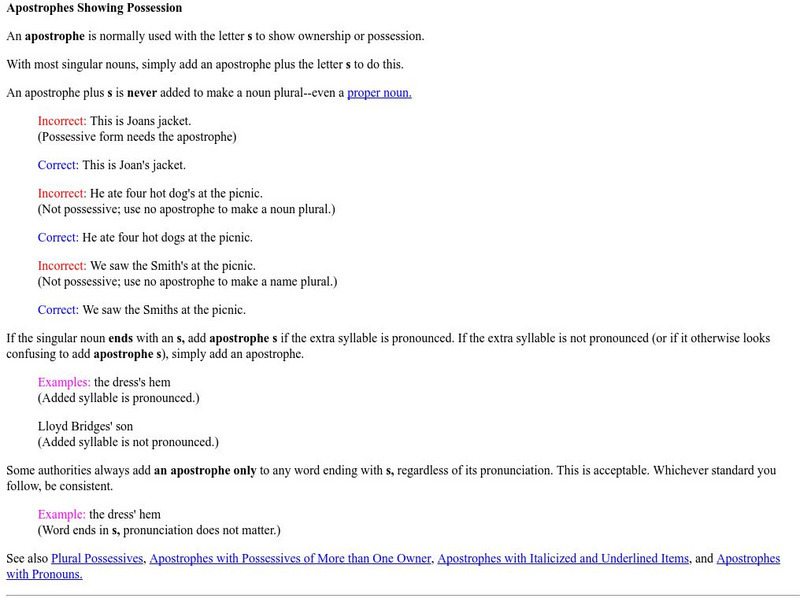San José State University
Nouns: The Basics
Need to work on nouns with your class? This handout breaks down nouns and provides twelve sentences for noun identification practice. Help English language learners recognize nouns with the examples given on this handout.
San José State University
Possessive Apostrophes
A great review of possesive nouns and how to add apostrophes. Clearly demonstrating where to place the apostrophe for different nouns, the resource also notes some tricky exceptions. Reinforce the concept with a little practice putting...
Road to Grammar
Confusing Words
You bathe in a bath, and you might advise someone by giving advice, but how do you tell the difference between these commonly misused words? This page provides 10 sets of words that sound or look similar, but have different meanings....
San José State University
Commonly Misused Words
After reviewing two pages of commonly misused words: effect/affect, accept/except, there/their/they're, etc., learners must choose the proper word in ten different sentences. Note: Answers are listed at the bottom of page three.
Curated OER
Spanish Prepositional Pronouns
There are many different types of pronouns used in Spanish for various purposes. If your class has mastered subject pronouns, object pronouns, and reflexive pronouns, perhaps they are ready to learn about prepositional pronouns. You can...
Grammarly
Grammarly Blog: Possessive Nouns
An explanation with examples of possessive nouns and their use of apostrophe.
Goodwill
Gcf Global: Possessives
Tutorial explores how to use possessive nouns and adjectives correctly.
Other
K12 Reader: Possessive Nouns
Take a look at examples of possessive nouns, both singular and plural.
Capital Community College Foundation
Guide to Grammar and Writing: Possessive Forms
As you learn possessive forms, you will also learn about gerunds, present participles, compound nouns and more. This is a very complete resource tool for this subject.
Grammarly
Grammarly Blog: Possessive Case of Nouns: Rules and Examples
This page expains the rules for forming possessive nouns and provides examples.
Bartleby
Bartleby.com: William Strunk on the Possessive Singular
William Strunk Jr.'s "Elements of Style" on the creation of possessive singular nouns. Provided by Bartleby.com
Other
Grammar quizzes.com: Possessive Nouns: Indicating Possession
A series of carts containing rules and examples of possessives including singular and plural common nouns, proper nouns, inanimate nouns, days and holidays, and numbers and letters. A fourteen-question practice exercise follows the...
English Plus+
Grammar Slammer's Apostrophes Showing Possession
This site discusses the correct and incorrect usage of apostrophes to show possession and examples are provided. Note that links are provided at the bottom of the page for other specific uses of the apostrophe.
Other
English Grammar 101: Possessive Nouns
Online grammar lesson gives an explanation of possessive nouns with follow-up practice exercises. Immediate feedback is provided.
English Plus+
Plural Possessives
This site discusses the correct and incorrect usage of apostrophes to show possession with plural nouns.
Grammarly
Grammarly Blog: Nouns
This page focuses on nouns including definitions, types of nouns (person, place, thing/idea), common vs proper nouns, types of common nouns (concrete, abstract, collective), nouns as subjects, nouns as objects, nouns as subjective and...
Capital Community College Foundation
Guide to Grammar and Writing: Abstract Nouns
The composition of a noun is more than just a person, place or thing. Use this resource to study examples of nouns and their many uses.
Online Writing Lab at Purdue University
Purdue University Owl: Possessive Pronoun and Apostrophe
This Purdue Online Writing Lab article explains the three uses of the apostrophe.
Capital Community College Foundation
Guide to Grammar and Writing: Cases of Nouns and Pronouns
In this writing and grammar tutorial, learn how to distinguish and use nouns and pronouns in English and whether they are subjective, nominative, possessive, or objective.
Capital Community College Foundation
Guide to Grammar and Writing: Plural Forms
A good explanation of Plural Forms for the student. Site also offers a quiz at the end. L.11-12.2b Spelling
SUNY Empire State College
Empire State College: Apostrophes
This resource looks at the three main uses of apostrophes: to take the place of deleted letters; to show possession; and to show plurals of letters, numbers, symbols, abbreviations and words used as words.
Grammarly
Grammarly Blog: Apostrophe Rules
This page focuses on the rules for the uses and misuses of the apostrophe including contractions and omissions, possessive nouns, possessive pronouns, how to write joint possession, plurals, apostrophes with surrounding punctuation, and...
Towson University
Towson University: Online Writing Support: Determiners
This entry focuses on the types of determiners including articles, possessive nouns, numbers, indefinite pronouns, and demonstrative pronouns and provides examples of each.
Get It Write
Get It Write: Making Proper Names Plural but Not Possessive
This tutorial explains how to make your last name plural when sending greetings from your entire family (or anytime you are talking about your entire family.) This is a very common grammatical problem, and it is explained clearly here....
Other popular searches
- Possessive Nouns Worksheets
- Plural Possessive Nouns
- Singular Possessive Nouns
- Nouns Worksheets Possessives
- Plural and Possessive Nouns
- Plurals and Possessives
- Possessive Nouns Activities
- Possessive Nouns Apostrophes
- Possessive Nouns Unit
- Grammar Possessive Nouns
- Plural Possessive Nouns Book
- Plural Possessive Nouns Quiz
